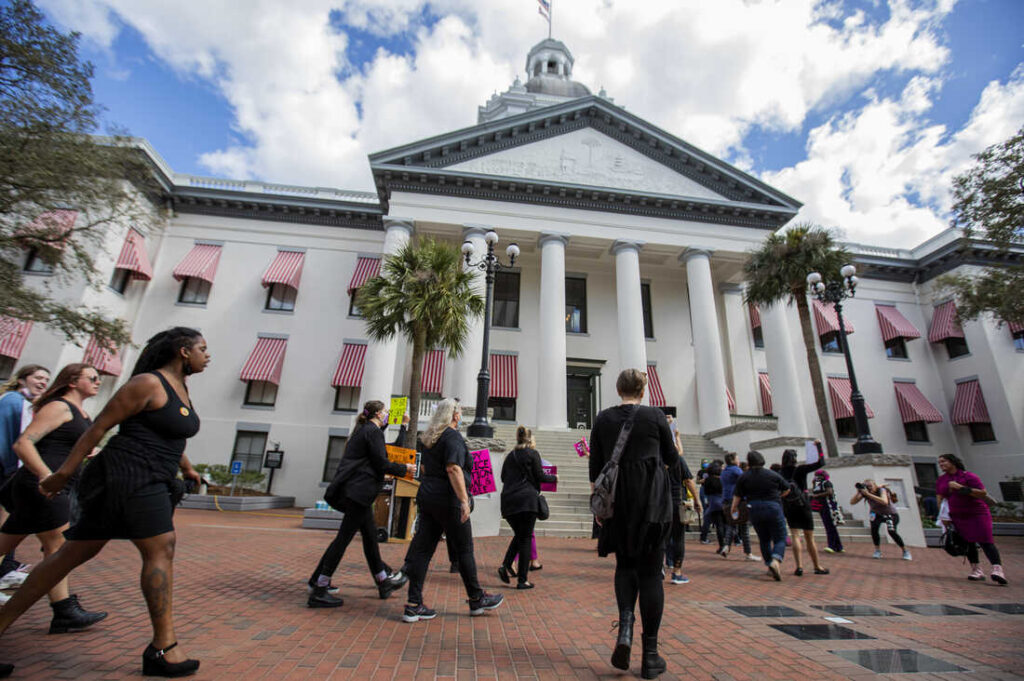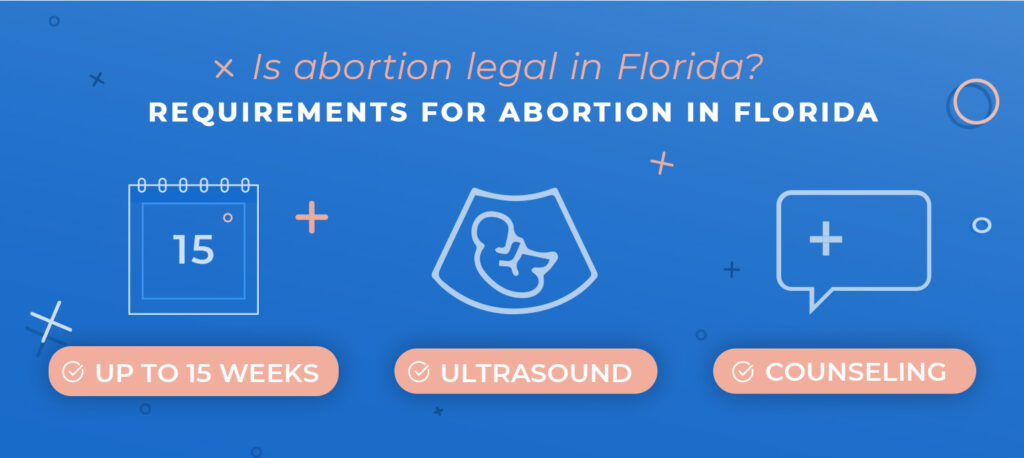
Before Roe v. Wade
The memory of Roe v. Wade has brought the United States through numerous phases. Specifically, Florida has gone through various changes in regards to the memory of Roe v. Wade and other abortion laws. Florida provided citizens with a constitutional right of a freestanding privacy policy [2]. That policy was challenged in 1989 when In re T.W. appeared before the Florida Supreme Court. The In re T.W. case stated that “Prior to undergoing an abortion, a *1189 minor must obtain parental consent or, alternatively, must convince a court that she is sufficiently mature to make the decision herself or that, if she is immature, the abortion nevertheless is in her best interests [3].” This case requires parental consent before a mother can proceed with an abortion which conflicted with Florida’s constitution of privacy. The overall problem of this was that Florida had two constitutional protections, a general privacy right along with a privacy right protecting an individual’s decisions relating to medical care, and one constitutional provision, In re T.W. [2].
Recent Abortion Laws
As of July 1, 2022, Floridians went from being able to receive an abortion up to 24 weeks of pregnancy (in memory of Roe v. Wade) to not be able to receive an abortion after the 15th week of pregnancy (Roe v. Wade being overturned). An exception to an abortion procedure being legally performed after the 15th week would be if the mother could potentially result in serious injury or death, or if the fetus has a fatal abnormality [4]. More restrictions that were placed into effect on June 28, 2022 include: a patient must receive mandatory state directed counseling, a parent must provide consent for the abortion, an ultrasound must be provided for the mother, health plans and public funds will only be provided in cases such as rape or incest, and for life threatening cases an abortion can be provided after 24 weeks of the last menstruation cycle [5].
Additionally, on July 1 2022, the HB5 law prohibited any abortions to take place if the gestational, “gestation was defined in HB5 (2022) as being calculated from the first day of the woman’s last menstrual period,” age of the fetus was after 15 weeks. This was implemented to “reduce fatal and infant mortality [1].” Although as of April 3, 2023, Florida passed a new Heartbeat Protection Act. The passing of this act prohibits any abortions to take place after 6 weeks of pregnancy. Certain circumstances have been made an exception such as incest, rape, human trafficking, or diagnosed fetal fatal abnormality which extends the abortion cut off back to 15 weeks [6]. Senator Grall spoke on the Bill that was passed, “This bill represents an unprecedented opportunity to protect innocent life, and to stand with the brave moms who choose life for their babies. For 50 years, it was legal in this country to kill unborn children, and during that time, abortion has touched every single one of us. We have to grieve for what we have done as a country. This bill makes certain our laws reflect the strongest protections for innocent life [6].” The senator also makes sure to emphasize how instead of promoting abortion they will promote adoption and support families who have the proper resources to take care of children in the system.

Florida’s Agenda
It is important to mention how Florida provides numerous ways of support for those who “choose life for their babies [6]”. SB 300 in Florida states that counseling and mentoring sessions will be provided for the families if wanted. Another way the Florida government provided support includes assisting with non-medical materials such as cribs, car seats, clothing, formula, etc., for the child. In addition, SB 2500 includes ~$475 million dollars towards postpartum care coverage on top of the $30 million of new funding that was included in the SB 300. The SB 300 also calls for in person abortions and prohibits abortion medication to be delivered by mail [6]. From these bills it appears that Florida representatives want to give the impression that the mental and physical health of the mother and the status of the fetus is a top concern. The incentives provided for not partaking in abortions try to cover up the cultural memory of Roe v. Wade.
A notable observation from the words of Senator Grall is that she never mentioned the word “fetus”, instead she continuously referred to it as an unborn child. This leads to the possible assumption that Florida’s representatives believe the status of a fetus as an entity is a human life with rights. In connection to this, Thomas Jefferson wrote in the Declaration of Independence how everyone deserves the right to life, liberty, and the pursuit of happiness. Since an embryo forms a heartbeat after about 6 weeks, the Florida government passed this Heartbeat Protection Act in order to protect what they consider a life. According to Florida, this means the fetus has unalienable rights in memory of our Declaration of Independence.
Anaya Williams
Works Cited
[1] CS/HB 5 (2022) – Reducing Fetal and Infant Mortality. Bills for the Regular Session 2023 | Florida House of Representatives. (n.d.). Retrieved April 21, 2023, from https://www.myfloridahouse.gov/Sections/Bills/bills.aspx
[2] Gordon, Daniel R. “One Privacy Provision, Two Privacy Protections, The Right to Privacy in Florida after Roe v. Wade.” HeinOnline, https://heinonline.org/HOL/Page?handle=hein.journals/wiswo5&div=6&g_sent=1&casa_token=&collection=journals
[3] In Re TW.” Justia Law, https://law.justia.com/cases/florida/supreme-court/1989/74143-0.html
[4] Selene San Felice, B. M. (2022, June 24). Roe v. Wade: Is Abortion Legal in Florida? Axios. Retrieved April 21, 2023, from https://www.axios.com/local/tampa-bay/2022/06/24/roe-v-wade-overturned-florida
[5] State facts about abortion: Florida. Guttmacher Institute. (2022, August 30). Retrieved April 21, 2023, from https://www.guttmacher.org/fact-sheet/state-facts-about-abortion-florida
[6] The Florida Senate. Press Release – The Florida Senate. (n.d.). Retrieved April 21, 2023, from https://www.flsenate.gov/Media/PressReleases/Show/4437
Images
https://www.npr.org/2022/02/17/1081450530/florida-house-abortion-ban
Focusing on Florida is a very important aspect of the Roe v. Wade case because it has a lot to deal with why society is fighting as hard as it is. Florida is a state in which a lot of backlash already occurs as it is one of the US’ southern most states, but with this, they work to set the precedent for a lot of other potential laws and regulations that other states might adopt. This is why Florida’s view on certain human rights is so dangerous. The government should set in place regulations when it deals with using words such as “fetus” v. “unborn child” because the narrative gets changed.
I think the distinction made between “fetus” and “unborn child” is interesting. “unborn child” seems to be more vernacular. It connotes more emotion as we think of children to be innocent and helpless. Also as there is no exact stage at which an embryo or fetus becomes a person, it’s interesting to see how referring to the fetus as a child also establishes it as both human and a person. There is debate as to whether abortion kills a person or a human. I think in your article the distinction is used to support the idea that the fetus is first and foremost a living human and the view of Floridian lawmakers are that as a living being, the fetus or “unborn child” is granted those rights. Based on the excerpt of Senator Gall’s statement it seems the goal of rewriting these new abortion restrictions is to obliterate the memory of Roe v. Wade in American memory. National memory is being taken to a particular level within the state, Florida then establishes its own memory of the case as they had to write laws post Roe v. Wade to allow abortions to be more accessible, and now, after the overturning, they rewrite state laws and history to obliterate the memory of Roe v. Wade.
It seems as though a lot of newer restrictions on abortion and education are coming from Florida, this is incredibly dangerous as their decisions are starting to affect the decisions of other states. A vernacular term I’ve been hearing recently is “The Florida Effect” which describes the rippling effects of Florida’s dangerous laws. Florida uses the argument that fetuses are “unborn children” and therefore deserves the right to life; however, they fail to consider the quality of life/happiness that the child will experience after birth.
This is a uniquely American perception of what it means to make abortion legal. Florida serves as an example of the interplay between states and the federal government, which would make individuals perception of the legality of abortion an interesting site of contradictory memory. A person can be a resident of a state as well as a citizen of a country, and abortion can be treated differently according to the region. This is an effective point of collective memory, because it differs according to identity (tied to location).
I found it very interesting how much support Florida has offered for the women who choose to go through with their pregnancy. This something I believe more states should follow because for a lot of women, financial reasons are often some of the obstacles they face when deciding if they should keep the baby or not. With access to these basic needs for the babies, there is a more visual aspect in which the mothers can envision given their babies a good childhood. Therefore, these hundreds of millions that are being used for such things, will be an incentive for pregnant women.
I really enjoyed reading this and learning about how Florida treats abortions. I had not thought of doing a case study with a specific state. It was very interesting to see that they have so much support for those that go through pregnancy. I think that is great to see individually and would love to see it implemented everywhere. I think whether you are pro or anti-abortion everyone should agree that women should be supported if they decide to go through with their pregnancy. Also, the distinction between “fetus” and “unborn child” is intriguing as it highlights the emotional connotations associated with the latter term. By referring to the developing embryo or fetus as a child, it establishes the idea that the fetus is both human and a person.
Your post was very good I loved to learn more and read about abortion and Roe v. Wade in Florida. This is important because every state has there own way of viewing abortion and the Roe v. Wade court case. Learning about the Heartbeat Protection Act shows how quickly things in this state are changing. With so many changes to the laws in Florida that deal with abortion it makes me think about how this changes peoples collective memory, this can also become a part of Americas collective memories of overturning of Roe v. Wade.
This is an interesting issue. With the differences between the words fetus vs unborn baby, it is clear that both have an agenda they are pushing. People who want to call an embryo a fetus tend to want to dehumanize the unborn child so that it is easier to get rid of. Additionally, when calling a fetus an unborn child you are seemingly giving it attributes it might not have yet. It reminds me of how whoever controls the language also controls the people. To me it seems that people are so caught up with the one issue of exactly how legal abortion should be, that they forget about what else can be done for the people who are most effected by abortion either being legal or not. The people who are supposed to care about unborn and the mothers, constantly are only focusing on the one issue instead of other ways they might help.